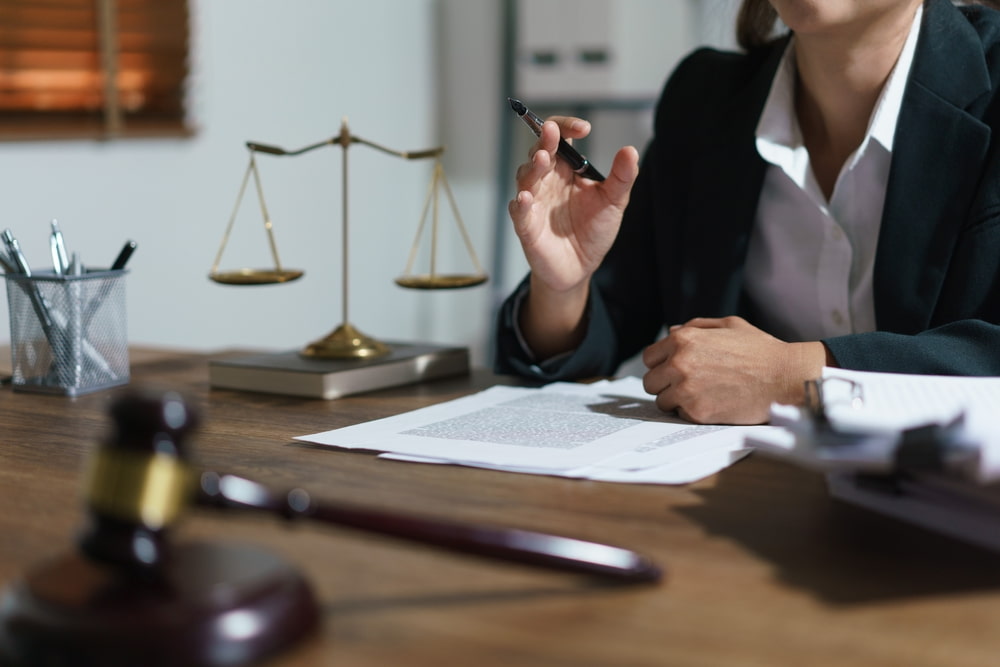How to Prepare for a Consultation with a Criminal Defense Lawyer

To prepare for a consultation with a criminal defense lawyer, you need to:
- Step 1: Gather all relevant documents, such as police reports and court summons, and write down your account of events with as much detail as possible.
- Step 2: Prepare Questions about potential outcomes, defense strategies, and the lawyer’s experience.
- Step 3: Be honest and transparent during the consultation, understand your rights, and discuss the fee structure.
Being charged with a crime can be a scary experience. Therefore, if you are currently facing a criminal charge, you should immediately consult with an experienced criminal defense lawyer in Los Angeles.
Before meeting with a lawyer, there are certain steps you should take, including gathering important documents and preparing questions. When you meet with your attorney, they can discuss the case circumstances, determine your options, and pursue the best possible result on your behalf.
Quick Navigation Menu
- Steps You Should Take When Preparing to Meet with a Criminal Defense Lawyer
- Questions You Should Ask a Criminal Defense Lawyer at Your First Meeting
- How Can a Criminal Defense Lawyer Help with Your Case?
- Potential Consequences of Not Retaining a Criminal Defense Lawyer in Your Case
- Ways of Successfully Resolving a Criminal Case and How a Criminal Defense Attorney Can Help
- Speak with a Knowledgeable Criminal Defense Lawyer Today
Steps You Should Take When Preparing to Meet with a Criminal Defense Lawyer
Preparing to meet with a criminal defense lawyer can be a crucial step in navigating legal proceedings effectively. Here are some important steps you should take to ensure your meeting is productive and beneficial:
- Gather Relevant Documents — Before your meeting, gather any documents related to your case, including police reports, court summons, witness statements, and any communication with law enforcement or other parties involved.
- Write Down Your Account — Take the time to write down your recollection of events leading up to the incident. Include as much detail as possible, such as dates, times, locations, and the actions of all parties involved.
- Prepare Questions — Consider any questions or concerns regarding your case or the legal process. These can include inquiries about potential defenses, the likelihood of certain outcomes, or the lawyer’s experience in similar cases.
- Be Honest and Transparent — Be completely honest with your lawyer about your involvement in the situation. Providing accurate information allows them to build the strongest possible defense on your behalf.
- Understand Your Rights — Educate yourself on your legal rights and what to expect during the legal process. Your lawyer can help clarify any aspects of the law you may not understand.
- Consider Potential Outcomes — Take some time to consider the potential outcomes of your case and what you hope to achieve. Discuss these goals with your lawyer so they can tailor their strategy to align with your objectives.
- Review Fee Structure — Familiarize yourself with the lawyer’s fee structure and discuss any financial concerns you may have. Some lawyers offer payment plans or may work on a contingency basis, depending on the nature of your case.
- Stay Calm and Focused — Meeting with a criminal defense lawyer can be stressful, but staying calm and focused during your discussion is essential. Try to provide information clearly and concisely, and do not hesitate to ask for clarification if needed.
- Follow-Up — After your meeting, follow up with any additional information or questions that may arise. Maintaining open communication with your lawyer is vital to building a solid attorney-client relationship.
By following these steps, you can ensure that your meeting with a criminal defense lawyer is productive and helps set the stage for a successful defense of your case.
Questions You Should Ask a Criminal Defense Lawyer at Your First Meeting
When meeting with a criminal defense lawyer for the first time, it is essential to ask the right questions to gain clarity and insight into your case. Here are some important questions to consider:
 What is your experience with cases like mine?
What is your experience with cases like mine?
Understanding the lawyer’s experience and track record with cases similar to yours can help gauge their skill and ability to handle your situation effectively.
What are the possible outcomes of my case?
Having a realistic understanding of your case’s potential outcomes is crucial. A skilled lawyer can provide insights into the possible consequences and strategies for achieving the best possible result.
What defense strategies do you recommend?
Discussing potential defense strategies with your lawyer can help you understand your options and make informed decisions about proceeding with your case.
What will be my role in the legal process?
Clarifying your role in the legal process can help prepare you mentally and emotionally for what lies ahead. Ask your lawyer what they expect from you and how you can best support your defense.
What challenges do you anticipate in my case?
Identifying potential challenges early on allows you to work proactively with your lawyer to address them. Ask about any obstacles or complexities that may arise in your case and how they plan to overcome them.
What is your approach to communication?
Establishing clear lines of communication with your lawyer is essential for a successful attorney-client relationship. Ask how they prefer to communicate (e.g., by email or phone calls) and how often you can expect updates on your case.
What are your fees and billing practices?
 Understanding the lawyer’s fee structure and billing practices upfront can help avoid surprises. Ask about their fees, payment plans, and whether they offer any alternative billing arrangements.
Understanding the lawyer’s fee structure and billing practices upfront can help avoid surprises. Ask about their fees, payment plans, and whether they offer any alternative billing arrangements.
Can you provide references or client testimonials?
Requesting references or client testimonials allows you to get a sense of the lawyer’s reputation and the satisfaction level of past clients. Positive feedback can instill confidence in your decision to hire them.
What is the next step in the process?
Finally, ask your lawyer what the next steps will be in handling your case. A clear action plan can alleviate uncertainty and help you feel more confident about moving forward.
By asking these important questions at your first meeting with a criminal defense lawyer, you can gain valuable information and insight to help you navigate your case effectively.
How Can a Criminal Defense Lawyer Help with Your Case?
A knowledgeable criminal defense lawyer can be instrumental in helping you navigate the legal system and achieve the best possible outcome for your case. Here are some of the ways they can assist:
- Legal Skill — Criminal defense lawyers have in-depth knowledge of criminal law and courtroom procedures. They can analyze the details of your case, identify legal issues, and develop strategic defense strategies tailored to your situation.
- Investigation — A lawyer can thoroughly investigate the facts surrounding your case. It may involve gathering evidence, interviewing witnesses, and examining police reports to uncover inconsistencies or errors that may benefit your defense.
- Negotiation — A skilled lawyer can often negotiate with prosecutors to secure a favorable plea bargain or reduced charges. They can advocate on your behalf during plea negotiations, striving to minimize the potential consequences of your case.
- Representation in Court — If your case goes to trial, your lawyer will provide strong and effective representation in court. They will present evidence, cross-examine witnesses, and argue legal points on your behalf to defend your rights and interests.
- Protection of Rights — A lawyer will protect your constitutional rights throughout the legal process. They will advise you on your rights during police questioning, pretrial proceedings, and trial, helping you avoid self-incrimination and other pitfalls.
- Emotional Support — Facing criminal charges can be emotionally draining and stressful. A supportive lawyer can provide reassurance, guidance, and empathy during this challenging time, helping you stay focused and resilient throughout the legal process.
- Case Management — Your lawyer will manage all aspects of your case, from paperwork and court filings to scheduling hearings and meetings. It allows you to focus on other important matters while trusting that your legal representation is in capable hands.
- Appeals and Post-conviction Relief — If you are convicted, your lawyer can help you explore appeals or post-conviction relief options. They can review your case for errors or misconduct, file appeals on your behalf, and advocate for your rights in appellate court.
- Advocacy for Alternative Sentencing — In some cases, a lawyer can advocate for alternative sentencing options, such as probation, community service, or diversion programs, instead of incarceration. They can present compelling arguments to the court in support of leniency and rehabilitation.
Potential Consequences of Not Retaining a Criminal Defense Lawyer in Your Case
Not retaining a criminal defense lawyer for your case may have serious consequences that can significantly affect your future. Some potential outcomes of not having legal representation include the following:
- Lack of Legal Knowledge — Without a criminal defense lawyer, you may lack the legal skills necessary to navigate the legal system and courts effectively. It may result in missed opportunities to present a strong defense, identify legal issues, or negotiate favorable plea deals.
- Limited Understanding of Rights — Criminal defense lawyers are well-versed in constitutional rights and legal procedures. Without one, you may not fully understand your rights during police questioning, pretrial proceedings, or trial, leaving you vulnerable to making statements or decisions that may harm your case.
- Inadequate Defense Strategies — Crafting effective defense strategies requires knowledge of the law and case precedents and the ability to analyze evidence. Without a lawyer, you may struggle to develop compelling arguments or challenge the prosecution’s case, increasing the likelihood of an unfavorable outcome.
- Risk of Harsher Penalties — Prosecutors are often more aggressive when dealing with defendants who lack legal representation. You may face harsher penalties without a lawyer to advocate, including longer prison sentences, hefty fines, or other punitive measures.
- Emotional and Mental Stress — Facing criminal charges without a lawyer can be emotionally and mentally taxing. You may feel overwhelmed by the legal process, uncertain about your rights, and anxious about the potential consequences of your case, leading to increased stress and anxiety.
- Limited Access to Resources — Criminal defense lawyers have access to resources and networks that can benefit your case, including investigators, expert witnesses, and legal research databases. Without a lawyer, you may lack these resources, making it more challenging to gather evidence or build a strong defense.
- Difficulty Navigating Court Procedures — Courtroom procedures can be complex and intimidating, especially for individuals without legal training. Without a lawyer to guide you through the process, you may struggle to understand court rules, file necessary paperwork, or effectively communicate with the judge and jury.
- Long-term Consequences — The consequences of a criminal conviction can extend far beyond the immediate penalties the court imposes. A criminal record can affect your employment opportunities, housing options, educational prospects, and personal relationships for years to come, limiting your future opportunities and quality of life.
Investing in experienced legal representation is essential to protecting your rights and securing the best possible outcome for your case.
Ways of Successfully Resolving a Criminal Case and How a Criminal Defense Attorney Can Help
Successfully resolving a criminal case often involves careful negotiation, strategic decision-making, and effective representation in court. Here are two primary methods of resolving a criminal case and how a criminal defense attorney can help:
Negotiating a Plea Deal
Negotiating a plea deal involves reaching an agreement with the prosecution to plead guilty to a lesser offense or to accept a reduced sentence in exchange for avoiding trial. It can be a beneficial option for individuals who wish to minimize the potential consequences of their case or who have strong evidence against them.
- Assessing the Strength of the Prosecution’s Case — A criminal defense attorney will thoroughly review the evidence against you and assess the strength of the prosecution’s case. This allows them to negotiate from a position of knowledge and leverage, advocating for the most favorable terms possible.
- Exploring Options and Consequences — Your attorney will explain the various plea options available to you and help you understand the potential consequences of each choice. They can guide you on whether accepting a plea deal is in your best interests based on the specifics of your case and your long-term goals.
- Advocating for Fair Terms — Your attorney will negotiate with the prosecution, advocating for fair and reasonable terms that align with your objectives. They will strive to secure the best possible outcome for you while protecting your rights and interests throughout the process.
- Ensuring Compliance with Legal Requirements — Plea agreements must comply with legal requirements and procedural safeguards. Your attorney will ensure that the terms of any negotiated plea deal are lawful and properly executed, preventing potential complications or challenges down the line.
Asserting a Legal Defense at Trial
If you choose to proceed to trial, your attorney will vigorously assert legal defenses and challenge the prosecution’s case in court. It involves presenting evidence, cross-examining witnesses, and arguing legal points to prove your innocence or raise reasonable doubt.
- Developing a Strategic Defense — A criminal defense attorney will develop a strategic defense tailored to the unique circumstances of your case. They will analyze the evidence, identify weaknesses in the prosecution’s case, and craft compelling arguments to defend your rights and innocence.
- Presenting Evidence and Witnesses — Your attorney will gather evidence, interview witnesses, and prepare expert testimony to support your defense. They will present this information clearly and persuasively to the judge and jury.
- Navigating Court Procedures — Courtroom procedures can be complex and intimidating, especially for individuals without legal training. Your attorney will navigate the intricacies of the legal process on your behalf, ensuring that your rights are protected and that all procedural requirements are met.
- Advocating for Your Rights — Throughout the trial, your attorney will advocate for your rights, challenge any improper conduct by the prosecution, and ensure that you receive a fair and impartial hearing. They will be your strongest advocate in the courtroom, fighting tirelessly to achieve a favorable outcome for you.
Speak with a Knowledgeable Criminal Defense Lawyer Today
If you are facing a criminal charge, you need to speak with an experienced criminal defense attorney as soon as possible. Your lawyer can determine your eligibility for various legal defenses, represent you during all courtroom proceedings, and aggressively advocate.

CONTACT A CRIMINAL DEFENSE ATTORNEY
Facing criminal charges in Los Angeles? Trust The Rodriguez Law Group to secure the best possible outcome. Our experienced criminal defense lawyers have 20+ years of expertise in handling criminal cases.



